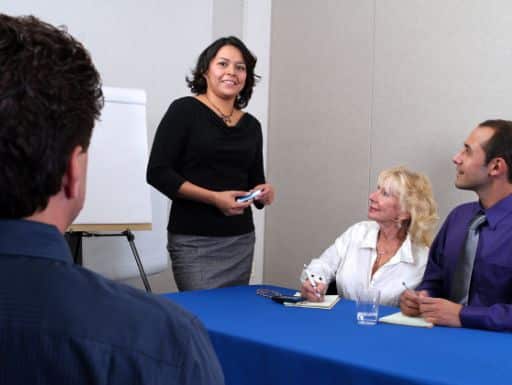
One of the easiest ways to become a professional public speaker is by speaking to groups within your current industry. In this article, we will show you a number of ways to get paid as a professional speaker without having to change careers. This article is a continuation of our previous article, How to Start a Public Speaking Career. Although this is just one of the three routes that we will cover in detail, this route is one of the most common (and perhaps the most lucrative as well). So, we will spend a little more time on this one.
One of the most important steps in beginning is just that, to start, otherwise, there’s no change. Just starting out gives you practice and room to improve. Improvement might be necessary because while you might have a friendly face, your body language could portray something else. While speaking, you may not connect with your audience enough and you might need to practice making more eye contact. So start off by speaking at low-stress meetings or community centers. Don’t start out your career by jumping into corporate events- they’re likely to have a large crowd. The best thing to do is to start where you’re comfortable. Good news is that’s easy to “rent,” start by presenting at home or work. Once you feel comfortable enough, seek out new and bigger venues.
Become a Professional Public Speaker by Sharing the Knowledge that You have Acquired within Your Current Industry
Become a Trainer within Your Current Organization
One of the most common public speaking careers (and one that most people don’t realize is a role as a professional public speaker) is being a trainer. Maybe because we don’t think about training someone as speaking; we view it more as helping someone or creating improvement and efficiency.
When I was in high school, I worked at a fast-food restaurant. A few months after I was hired, a new guy started.

Incidentally, a short time later, I was promoted to supervisor. There was a small raise, and I began training more of the new employees. So, in essence, I was a professional trainer for the first time in my short career. It was a great way to use my experience and knowledge to help the company and better my speaking habits.
Almost a decade later, when I became a sales manager, I was being paid to train the company’s sales team. The more that the team sold, the bigger the bonus that I received each quarter. During the sales meetings, I had to be a teacher, a coach, and a motivator. (It is very similar to what I do now as a professional speaker.)
Every single industry on the face of the Earth has to have a way to train new workers as they come into the organizations. In some cases, the jobs pay very little, but in some cases, they pay a lot.
For instance, my brother-in-law was a firefighter who got a second job working for a company that sold software to medical organizations. Since he was a paramedic, he had a background in medical semantics, so the company hired him to train their customers to use the software.
Because the training is so specialized, he gets paid a pretty generous fee, every time that he goes to a customer site.
Here is one more example. One of my instructors, John, started his career working at an eye-glass retail store, years ago. The store was a franchise, and the owner wasn’t making a great living. One day, the owner told the staff that he was selling the franchise, and John, although, he was only making a meager hourly wage, expressed an interest.
The owner, not having any other offers, self-financed the store for him. Over the next decade, though, under John’s leadership, the store flourished. In fact, he eventually was able to buy two additional stores.
Eventually, he sold all the stores for a huge profit, and he took some time off.
Of course, he got restless. He was also driving his poor wife crazy hanging around the house all day. So, for the first time in twenty years, he went looking for a job.
He ended up running the eye-glass store in front of his local Wal-Mart. Because he had so much experience running a store like this, he increased the revenue in his store over 300% in his first year.
The regional manager noticed, and he hired John to travel to every, single Wal-Mart in the country to train their managers and staff to do what he had done in his own store.
The point is that training, when done well, is a fantastic investment for any company. If you become a great trainer, you can make a fantastic living doing it.
Become a Trainer within Your Current Industry
Last week, I mentioned that one of my first instructors was a CPA who made extra income teaching for the CPA’s association. I also mentioned that these organizations, because they require continuing education, are much easier to teach within. But, what if you are in an industry that doesn’t require continuing education?
The truth is, that it doesn’t matter a whole lot. It just takes a little more research.

Each of these associations has meetings, and every meeting requires speakers to present. For instance, in October, San Antonio will be holding the Lonestar Reptile Expo as a supporter of the United States Association of Reptile Keepers. This is a convention for reptile keepers and enthusiasts. Vendors include a particular area of expertise in geckos and gophers and provide ideas for reptile habitats and snacks.
But What About The Moo-lah?
One question that you might have about these types of speeches is, “Do you actually get paid to do these types of presentations?” Well, in some cases, yes. Conventions hire me all the time to do breakout sessions and keynote speeches. Event organizers will look for and hire people to speak and potentially pay for it. In most cases, though, not really. You might get a small honorarium or a free trade show booth, but many of these types of speeches are done on a volunteer basis. However, if you are trying to start a speaking career, these are great places to get on stage, get a video of you professionally speaking, and also get your first raving fans. The video you make in front of a live audience can be a great way to gain social media exposure.
In addition, even if you don’t get a fee for speaking, you can still make money by…
Become a Consultant. Sell Your Expertise to Others Who Want to Do What You Do.
One of the things that professional public speakers know that others don’t is that what is commonplace for you is uncommon to others. The information that you have about your industry can be very helpful to people who are either new to the industry or… for want of a better phrase, less successful than you. The great news for you is that, with the technology that is available today, you can sell this knowledge without incurring any expense on your part.
College professors often use their own books as texts for the classes, and they require their students to purchase those textbooks. I had one graduate assistant, though, who taught a lab class for us, and this guy didn’t have a book yet. However, he started the class by saying, “If you plan on attending every single one of these classes, taking notes, and studying, you will make an A. If you feel like you may miss a class somewhere along the way, you can go to the bookstore and purchase my notes.” Every person in the class headed for the campus bookstore and purchased photocopies of his handwritten notes. (And I’m pretty sure that we all made A’s.)
Speaking From Experience
When I started the Fearless Presentations ® class, I didn’t have a huge amount of operating capital. In fact, I wasn’t able to create the Home Study Course version of the program for six years. At the time, I had to rent out a recording study, record the audio for the entire class, edit the audio, and then send the files out to a company that created thousands of CD sets of the class. It cost me a fortune. (By the way, I still have hundreds of these CD sets left if you have some way to play them, lol.) However, I was able to capitalize on new technology created by Amazon in 2002. I was able to self-publish my book by just uploading a PDF version of the book to their website. Within a couple of weeks, I had a self-published, printed book. (I also had the PDF version published as a Kindle book, by the way.)

Today, though, you have a lot more opportunities than I had when I started. A simple, webcam recording along with a free movie maker program, like iMovie, will create much more professional recordings than I was able to do in a studio years ago. If you don’t like to write but are a good speaker, make a recording of yourself giving a presentation. Then send the recording to a transcriber on Guru.com, eLance, Fiverr or some other contractor website. That transcript can be a handout, mini-book, or if you put a few together, a full-length book.
Click here to see how you can create the perfect seminar handout for your next presentation.
If you really want to get paid speaking gigs, you have to have written material that you have created and videos of you speaking in front of groups. So, the ideas in this post are good ways to get started. But that’s the thing, even industry leaders and professional speakers had to start somewhere. Just getting started is the best way to get your career going in professional speaking.
In the next post, we’re going to show you have you can also become a professional public speaker by using your presentations to market yourself!

